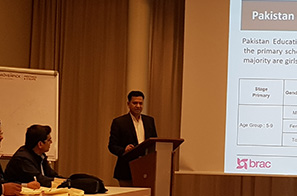
BRAC
LANSA-BRAC joint study reveals
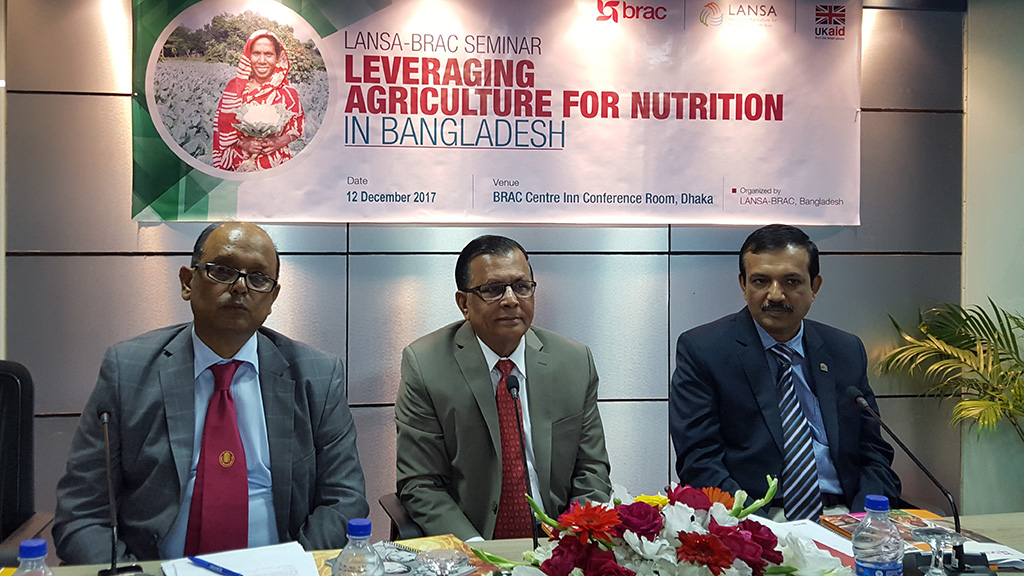
Crop diversification have positive impact on nutritional intake
Crop diversification helps increase the intake of nutritious food by giving households more options in food items to choose from. A study, conducted from 2010-11 to 2014-15, reveals that underweight population among the participant community reduced by 4.5 per cent over this period.
The findings further show that over the study period normal weight population among the participating households increased by 2.3 per cent. Also underweight male population reduced by 4.4 per cent, while female population of the same category reduced by 5.3 per cent.
‘Econometric analysis revealed that crop diversity level has direct influence on dietary diversity and, thereby, on the nutritional status of the individual,’ the study concludes.
International research body Leveraging Agriculture for Nutrition in South Asia (LANSA) and development organisation BRAC conducted the study titled ‘Crop diversity, dietary diversity and nutritional outcome in rural Bangladesh: Evidence from panel households’ with 500 participating households in 12 villages of 11 districts across the country.
LANSA-BRAC consultant Dr Uttam Kumar Deb and BRAC’s Research and Evaluation Division (RED) director Professor Abdul Bayes led the study.
The findings of the study were presented at a seminar styled ‘Leveraging agriculture for nutrition in Bangladesh’ today on Tuesday (12 December 2017) at the BRAC Centre in the Dhaka city. The event was supported by UK AID.
Agriculture secretary Md Kaykobad Hossain was present at the seminar as the chief guest, while Professor Abdul Bayes moderated. BRAC Agriculture and Food Security Programme’s head Dr Md Sirajul Islam, International Food Policy Research Institute (IFPRI) research analyst Tauseef Salahuddin, and RED senior research fellow Barnali Chakraborty presented three other papers at the event. Agriculture joint secretary Balai Krishna Hazra and WorldFish country director Dr Malcolm Dickson, among others, also spoke at the seminar.
Md Kaykobad Hossain said, ‘It is difficult for Bangladesh to mitigate the challenges including that of increasing the nutritional intake for the 160 million people with limited resources. As a part of its efforts, the government is giving emphasis on distribution of nutritious food items besides rice under its VGD (Vulnerable group development) programme.’
‘Rice cannot fulfil our daily need of food intake. So the government is now motivating the farmers to produce new crop varieties apart from rice,’ he further said.
‘Besides food crop production, we have to increase our focus on building quality storage system,’ added the agriculture secretary.
Professor Abdul Bayes said, ‘It is true that Bangladesh has made better progress in increasing people’s nutritional intake than some of the disadvantaged African nations, but to make further progress our farmers need to reduce their dependence on rice cultivation.’
Professor Bayes in his presentation pointed out that during the study period, 99 per cent of the farmland was under rice cultivation throughout the monsoon, which changed outside the rainy season to bring more than 45 per cent of farmland under non-rice crops.
The community in the study area, however, generally manifested a positive trend towards cultivating varieties of crops. Households with larger farms and comparatively better institutional education showed more interest about crop diversification.
The speakers also warned that an upward trend of gaining weight in a section of the community is also evident from the study. During the study period, overweight population increased in the participant households by 1.9 per cent with overweight male population increased from 3.9 per cent to 5.6 per cent and female population increased from 9.3 per cent to 11.3 per cent. During the same period, obese population increased from 0.9 per cent to 1.2 per cent with obese male population increased by 0.5 per cent and female population increased from 1.3 per cent to 2 per cent.
Summaries from three more research work were also presented at the seminar. Dr Md Sirajul Islam presented the paper titled ‘A study on milk value chain for the poor in Bangladesh’. Barnali Chakraborty’s paper was titled ‘A capability approach to child nutrition: Parents’ stories in context of haor’, while Tauseef Salahuddin presented a paper styled ‘Dietary patterns in rural Bangladesh: What influence of agriculture?’
Growing number of women take to the driving seat
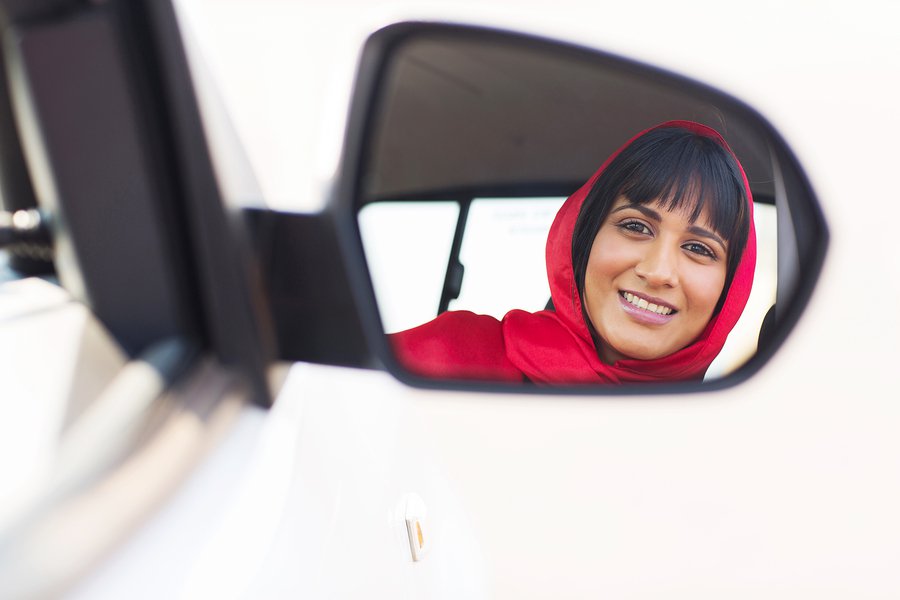
Women usually do not drive as rashly as their male counterparts
The number of women driving, in both professional and non-professional capacity, is quickly increasing as employers feel more secure with them.
Brac Driving School in Dhaka has taken up initiatives to train women as drivers for free, who then go on to get jobs different NGOs, other organisations and privately-owned vehicles.
Many women are stepping into the world of driving both as a necessity and as a hobby, said Traffic Police officials, adding that women tend to drive carefully on the road.
BRAC in Sierra Leone awarded the best NGO for Women’s Empowerment
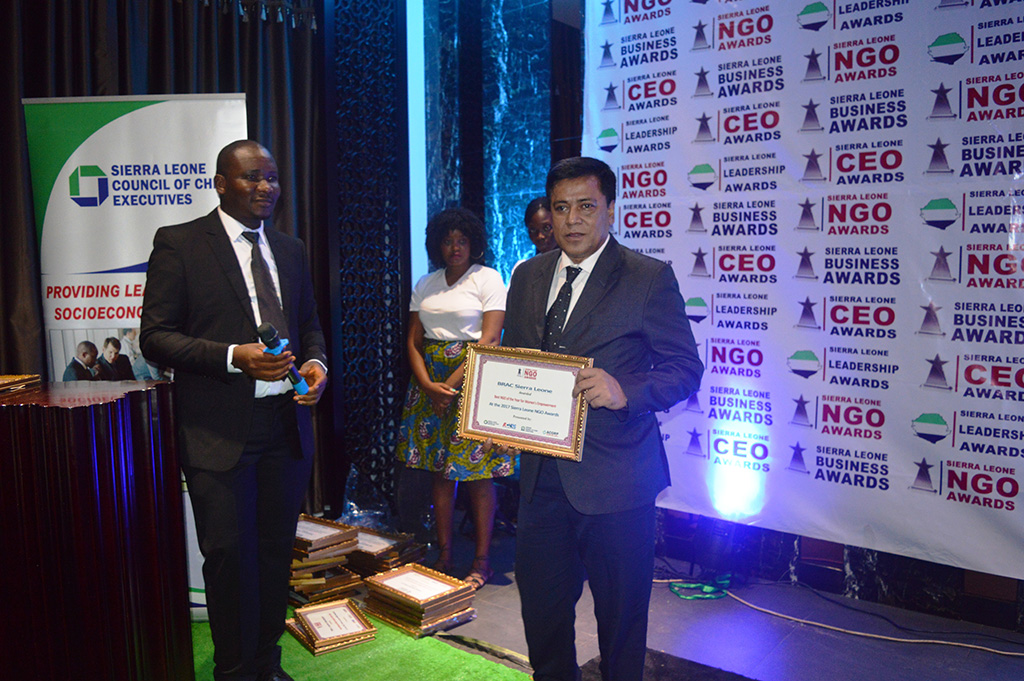
BRAC in Sierra Leone was awarded the ‘Best NGO for Women’s Empowerment' for 2017 by the Council of Chief Executives, a leading association of business leaders in Sierra Leone that is committed to sustainable economic growth and human development.
The award comes in recognition of BRAC’s role in empowering women through its programmes, management systems and innovations.
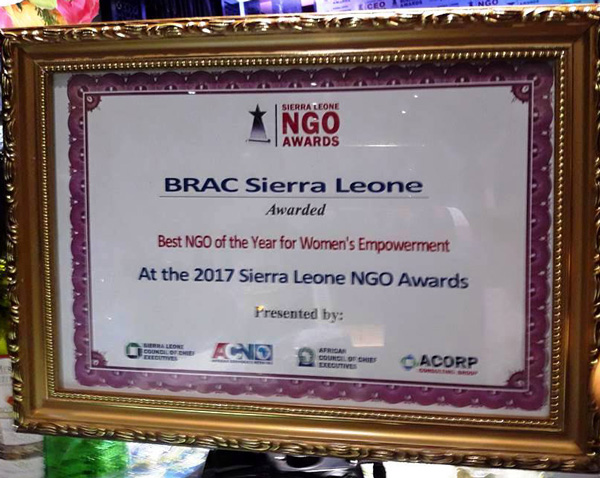
The award was accepted by the country representative, Rakibul Bari Khan, on behalf of BRAC in Sierra Leone. He described the award as "a great honor and recognition of our determination to empower the lives of women in Sierra Leone. Ultimately, we want to help the country achieve the Sustainable Development Goals, particularly the goal of attaining gender equality." He further noted, "In turn, the empowerment of women will help remove inequality and contribute to the eradication of poverty in all its forms."
80% of BRAC staff in Sierra Leone are women and over half of the programmes are run by women. The Empowerment and Livelihood for Adolescents (ELA) programme is completely run by women while all community health workers under the health programme are women; 95% of microfinance staff and clients are also women.
BRAC opened its offices in Sierra Leone in 2008 and currently reaches 2.3 million people through programmes in health, adolescents’ empowerment, agriculture and microfinance. It follows an integrated approach to development, implementing programmes through 30 branches in 11 districts across the country.
Global Panel policy brief published on achieving SDG
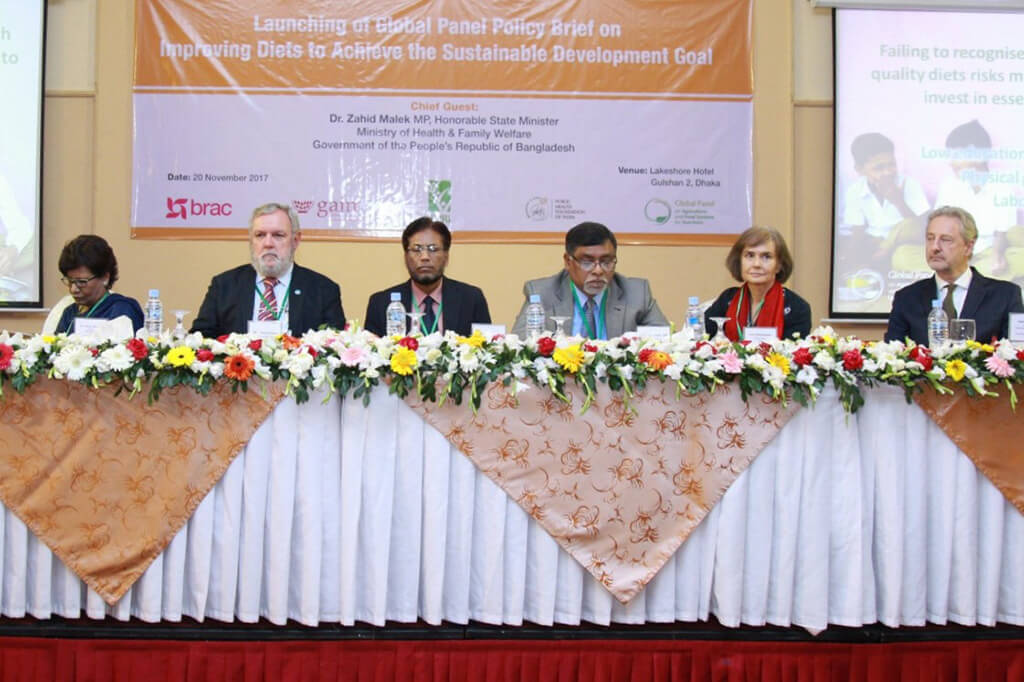
Lack of healthy diet puts more people at risk of death and diseases
Lack of healthy diet puts more people at risk of death and diseases in developing countries than things like air pollution, smoking and drug abuse. It has been reported that as a result of poor nutrition conditions, there was an estimated 11 percent drop in GDP of countries across Africa and Asia.
This, along with other insights, come from the new report on 'Healthy Diets for All: A Key to Meeting the SDGs' that was launched at this year's Global Panel meeting at a hotel on today in the capital. Zahid Malek, MP, Honorable State Minister from the Ministry of Health & Family Welfare, was present at the launching as the chief guest.
Panel members at the meeting included the Director of BRAC, Health, Nutrition and Population Programme, Dr Kaosar Afsana, Global Panel member Emmy Simmons, Global Panel Technical Advisor Professor Patrick Webb, Department for International Development (DFID) country director Jane Edmondson were also spoke at the meeting, BRAC, and Global Panel in collaboration with International Food Policy Research Institute and Global Alliance for Improved Nutrition, Public Health Foundation of India (PHFI) hosted this year's meeting in Dhaka on Monday, 20 November, 2017. The central agenda of the meeting was to engage policymakers at all levels and help them recognise the role of healthy diets in achieving the 2030 Agenda for Sustainable Development.
The report presented six evidence-based recommendations, aimed at policymakers in low and middle-income counties, showing how 'diet quality' can be the key to help them unlock and accelerate progress on meeting their Sustainable Development Goals.
These six areas of focus include – paying attention to diet quality in developing SDG plans; adopting food systems approach to meet the SDGs; focusing on improved diet for infants, young children and women; addressing barriers and shocks impeding access to healthy diets; widening national policy approach to ensure well-functioning food systems; boosting efforts to collect and report data on diet quality.
Zahid Malek MP stated, "this is a country of 160-170 million people. Despite few natural calamities and man-made disasters, Bangladesh has maintained its sustained economic growth. We are turning from lower middle income to middle income by 2021 or earlier. Even then, 45 million people live in absolute poverty, 40 million are suffering food insecurity, 7.3 million children are stunted, only three-fourths of under two children accessed minimal acceptable diet and 70% of our diets are cereal based."
He emphasized on five points to solve these problems; urge all relevant ministries to act in their own jurisdiction for improved nutrition and healthy diets for all with a multi-sectoral approach, propose a minimal healthy diet affordable to the people, rigorous advocacy and mass campaign for healthy diets, continuous and serious dialogue with commercial markets to make them pro-people, nutrition-sensitive and supportive for healthy population and all stakeholders – government, NGOs, UN and private sectors must work together for community mobilization.
The consensus at the meeting was that one critically important policy area that connects many of the SDGs, is the provision healthy diets for all. Invisible in terms of SDG language and not mentioned among the many targets, healthy diets are a foundation underpinning successful progress toward targets in health, agriculture, inequality, poverty and sustainable consumption.
Initiative to boost awareness on child marriage prevention
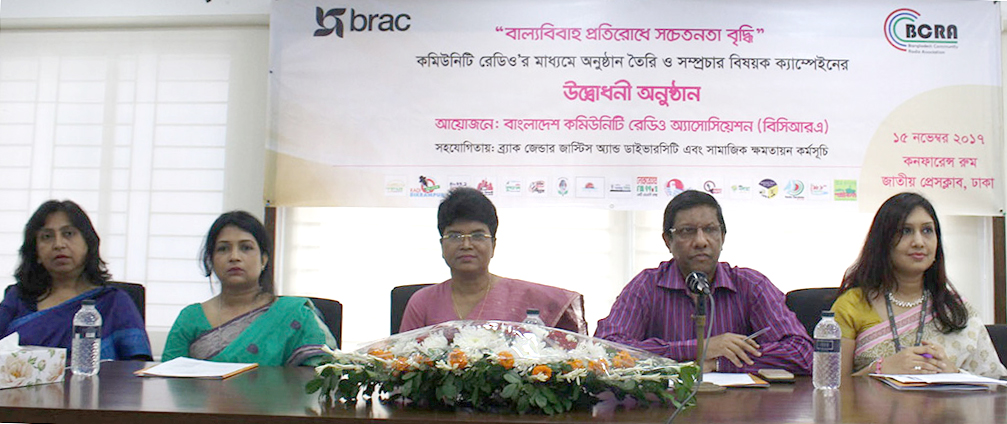
Community radios to commence unique two month long campaign.
As part of the efforts to raise awareness on the issue of child marriage, community radios will start communicating a unique campaign from November until December. A total of 17 community radios nationwide will be responsible for disseminating critical information on 11 topics surrounding child marriage in various native languages.
A thought sharing session was held today, titled “Increasing Awareness to Prevent Child Marriages,” at the National Press Club where the campaign announcement was made. The participants at the event included Additional Secretary of the Ministry of Information, Md. Mosharraf Hossain, Programme Coordinator of Gender Justice and Diversity at BRAC, Nishath Sultana, and Director of Community Empowerment Programme, Gender Justice and Diversity, and Integrated Development Programme at BRAC, Anna Minj.
It is revealed through the event that the topics covered by the community radio shows will include: child marriage, father’s role in child marriage, role of teachers and community leaders, community engagement, role of local government, role of social media, role of NGOs, involvement of boys and sexual harassment among others.
The development of the magazine shows, necessary skills building and promotion related activities will be carried out in collaboration among BRAC’s Gender Justice and Diversity and Community Empowerment Programme along with Bangladesh Community Radio Association.
BRAC Vice Chairperson awarded ‘Medical Award of Excellence 2017’
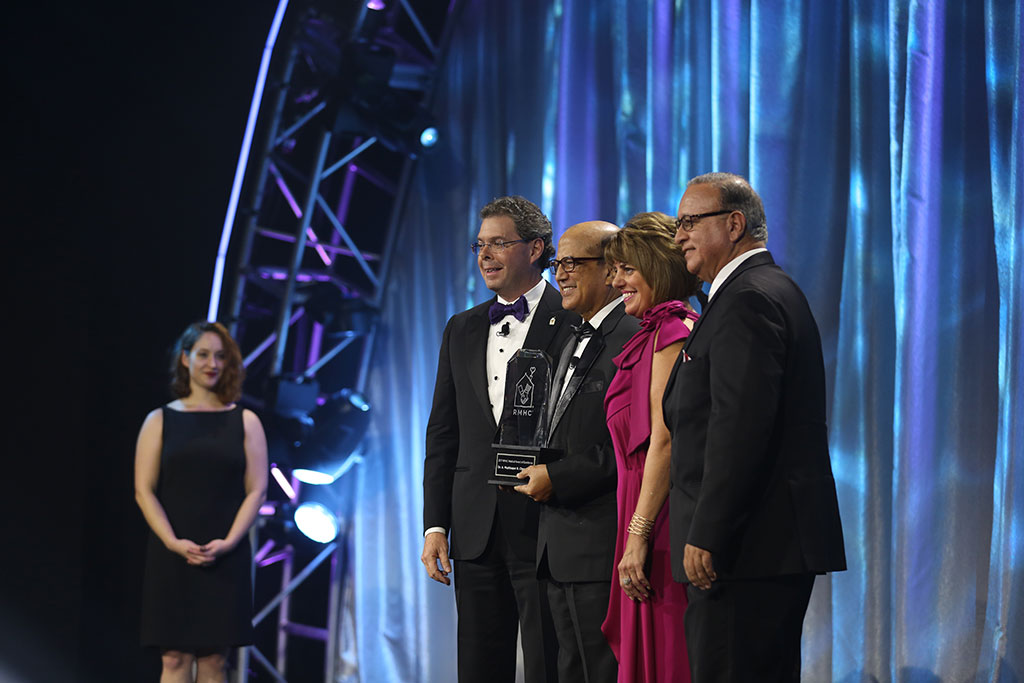
Dr Chowdhury honoured for work in public health globally.
Dr Mushtaque Raza Chowdhury, Vice Chairperson of BRAC, was nominated by the American non-profit Ronald McDonald House Charities for its ‘Medical Award of Excellence 2017’ along with a grant of USD 100,000. The award was given in recognition of Dr Chowdhury’s outstanding contributions in the field of primary health care and community-based education across developing countries. The ceremony was held on 11th November, 2017, in Illinois, U.S.
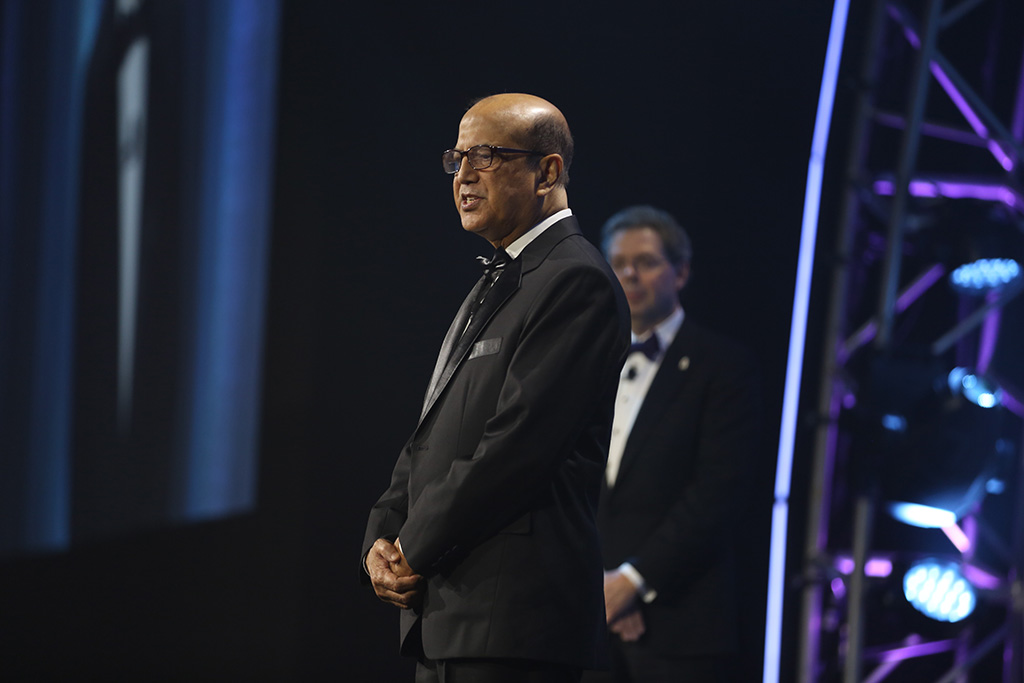
Among his vast body of achievements, Dr Chowdury is known for leading BRAC’s Oral Therapy Extension Programme that successfully stemmed deaths from childhood diarrhea by training mothers on oral rehydration solution (ORS) preparation. In addition to his role at BRAC, Dr Chowdhury is also the Professor of Population and Family Health at Columbia University Mailman School of Public Health and has implemented projects in countries like Nepal, Pakistan, Thailand, China and Ethiopia.
Dr Chowdhury has worked as Senior Adviser and acting Managing Director for Health at the Rockefeller Foundation, where he played a critical role in setting up several institutions in the South-East and South Asia regions. These include the establishment of the Department of Public Health and Informatics at Bangabandhu Sheikh Mujib Medical University, forming the Mekong Basin Disease Surveillance (MBDS) network, and setting up of a center on non-state sector studies in Vietnam.
Past recipients of the Award included former U.S. President Jimmy Carter, Health Minister of Rwanda Dr Agnes Binagwaho and Queen Noor of Jordan among others.
Simple and frugal solutions to scale quality education
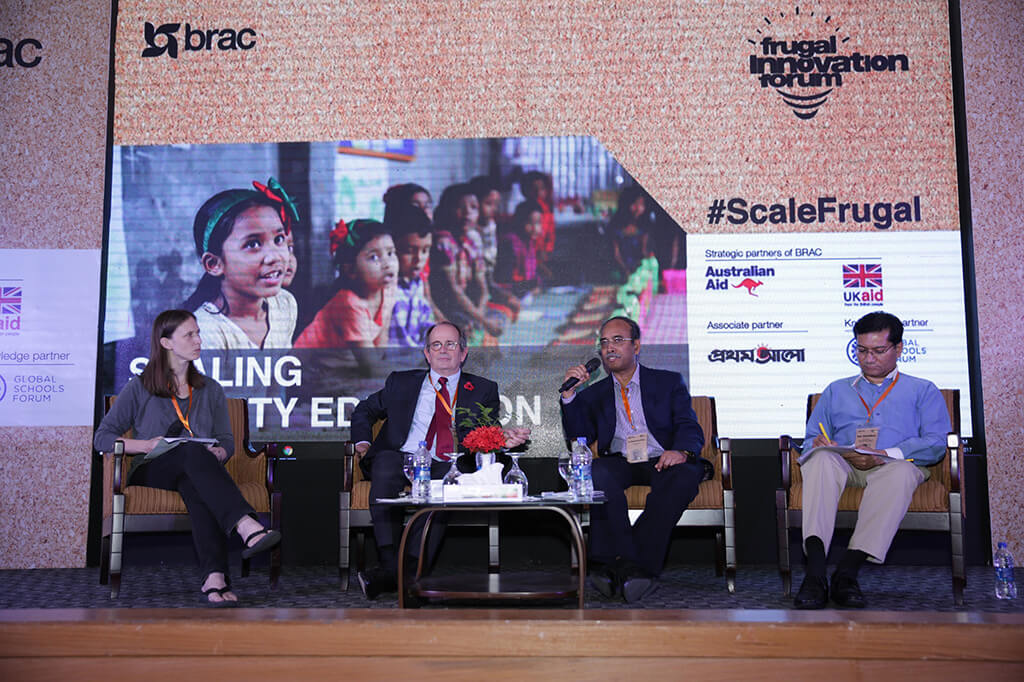
BRAC’s executive director, Dr Muhammad Musa said, “For education to be able to serve the future of our communities, we need to empower teachers, methodologies, practitioners and more importantly mindsets, in order to solve real problems with simple, frugal solutions, that include the under-privileged communities of the present world,” today on Saturday at the closing day of a 3-day international event on educational innovations organised at Savar, Dhaka.
Focusing on scaling up quality education, BRAC organised the programme titled ‘Frugal Innovation Forum 2017’ in 9-11 November 2017 at Savar CDM. The first day of the event was spent in the field, while discussions comprising 17 sessions were held in the next two days.
Primary and mass education minister, Advocate Mostafizur Rahman MP inaugurated the discussion sessions on Friday, which primarily focused on the potentials of different kinds of innovations to ensure quality education across the world. Educationists and innovators from Bangladesh, Australia, India, Nepal and South Africa presented 11 innovative models of quality education. Over 200 development activists, social entrepreneurs, educationists and researchers participated in discussions on the innovative approaches and projects adopted in the education systems of different countries around the world.
A special session on the education of refugee children titled ‘The displaced demographic: Classrooms for every child’ was held on the closing day. Abdul Moktader, Project Director, Save the Children Bangladesh; Jacqueline Strecker, Learn Lab Manager, UNHCR, and Mohammad Mohsin, ECD Specialist, UNICEF Bangladesh, were the speakers of the session.
Later on the closing day executive director of BRAC, Dr Muhammad Musa attended a session titled ‘Future of Education’. Dr James Tooley, professor of education policy at the University of Newcastle and Anir Chowdhury, policy adviser to the Access to Information (a2i) Programme at the Prime Minister’s Office, also spoke at this session.
Yesterday’s (10 November 2017) discussions focused on the changing trends in the education systems across the world. Dr Safiqul Islam, director of BRAC’s education programme, Ian Attfield, senior education adviser of DFID Education Policy Team, and Fathima Dada, global managing director of English and Schools, Pearson, were the speakers at this session titled ‘Shifting sands in global education across the world’.
Another important session from the second day called ‘Public private partnership in education - Lessons learnt from the region’ included Aashti Zaidi Hai, director of Global Schools Forum, Lee Crawfurd, head of research and evaluation of Ark Education Partnerships Group, Md Afzal Hossain Sarwar, policy specialist for educational innovation at Access to Information Programme at the Prime Minister’s Office, Bangladesh, and Shweta Anand Arora, director of The Education Alliance, as the speakers.
Asif Saleh, senior director for strategy, communications and empowerment of BRAC and BRAC International, gave the closing remarks of the event.
The BRAC Social Innovation Lab (SIL) has been organising Frugal Innovation Forum for the last four years (since 2013) with focus on pressing social issues. This year, the Bangla daily, Prothom Alo was the associate partner of the event while Global Schools Forum acted as the knowledge partner.
Mushtaque Chowdhury, PhD Vice Chairperson, BRAC
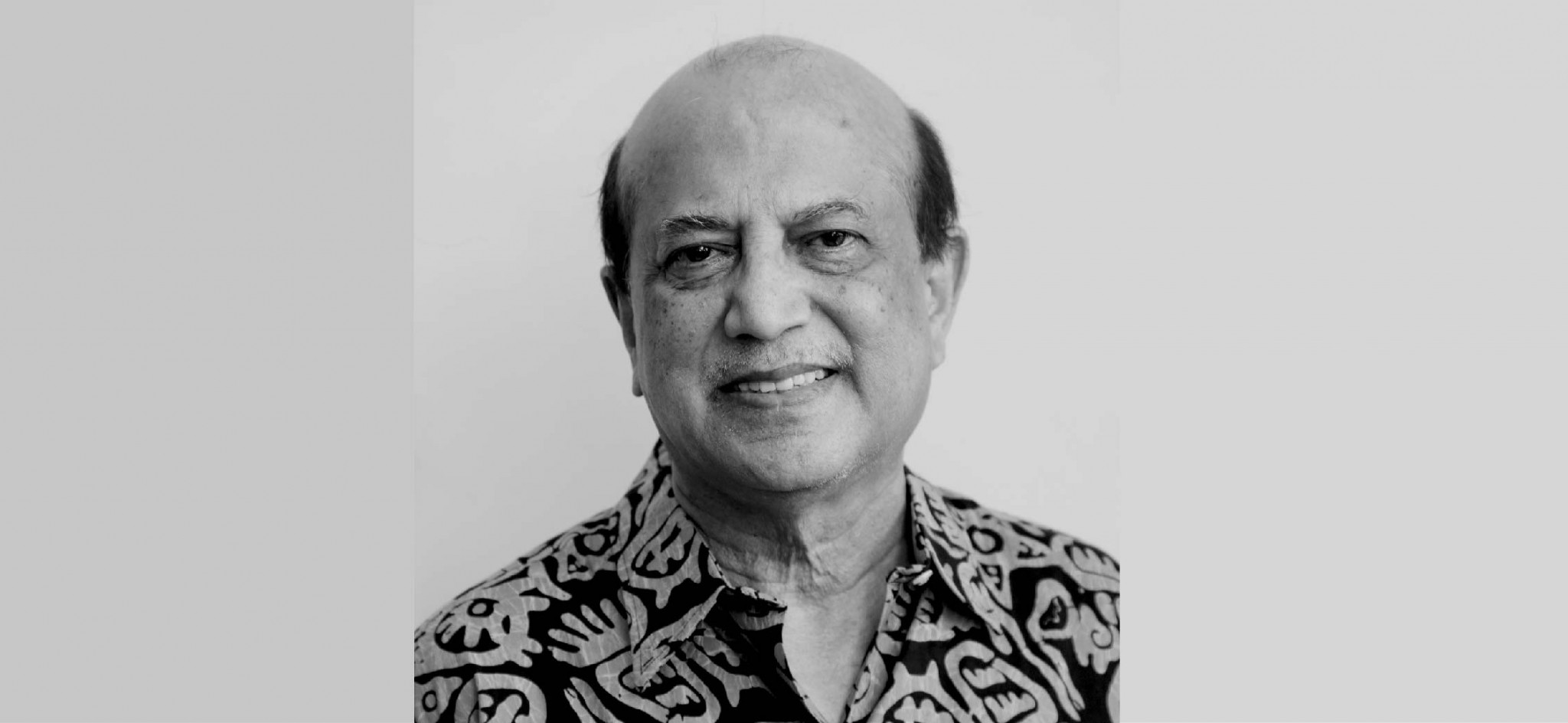
Dr. Mushtaque Chowdhury is the Vice Chairperson and advisor to the Chairperson and founder of BRAC. He is also a professor of Population and Family Health at the Mailman School of Public Health of Columbia University, New York. During 2009-2012, he served as a senior advisor and acting Managing Director of the Rockefeller Foundation, based in Bangkok, Thailand. He also worked as a MacArthur/Bell Fellow at Harvard University.
Dr. Chowdhury is one of the founding members of the two civil society watchdogs on education and health called Bangladesh Education Watch and Bangladesh Health Watch respectively. He is on the board or committees for several organizations and initiatives, including the Advisory Board of the South Asia Centre at London School of Economics, Lead Group for Scaling Up Nutrition Movement at United Nations and is the current chair of the Asia-Pacific Action Alliance on Human Resources for Health (AAAH). He is also the President of the Dhaka University Statistics Department Alumni Association (DUSDAA). Dr. Chowdhury was a coordinator of the UN Millennium Task Force on Child Health and Maternal Health, set up by the former Secretary-General, Kofi Annan, along with Professor Allan Rosenfield, Dean of the Mailman School of Public Health of Columbia University, New York.
BRAC and Australia Awards co-host Innovation Challenge
AUD 81,000 worth of grant funding provided to top projects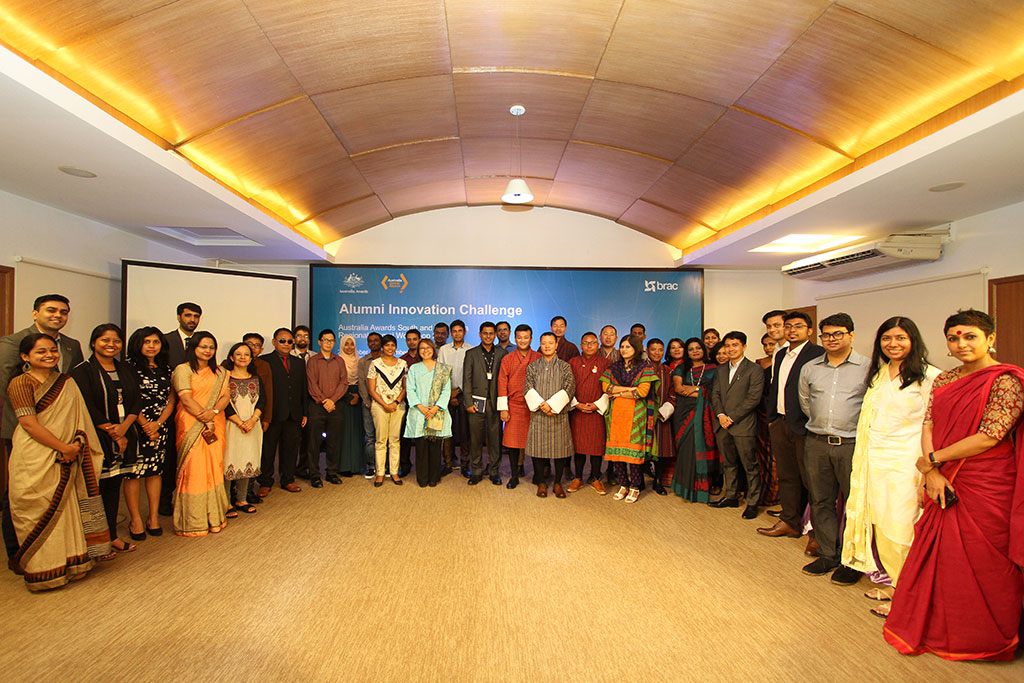
35 Australia Awards South and West Asia alumni, representing seven countries, started pitching project ideas today in Dhaka as part of the Alumni Innovation Challenge, which was organised jointly by BRAC and Australia Awards.
The platform provides alumni participants with funding to implement development solutions in their native countries. Out of over 80 project submissions, 27 projects were awarded grants and mentorship support. The selected alumni participants hailed from countries like Afghanistan, Bangladesh, Bhutan, Nepal, the Maldives, Pakistan and Sri Lanka.
The Alumni Innovation Challenge, inaugurated by Executive Director of BRAC Dr Muhammad Musa and Australian High Commissioner to Bangladesh (Her Excellency) Julia Niblett, let the grantees give their final pitch presentations to Heads of Mission from South Asia, officials from the Government of Bangladesh, international development agencies, fellow alumni, and other key stakeholders.
Praising the initiative, BRAC’s Executive Director Dr Muhammad Musa said, “BRAC and the Australian Government have a long standing commitment to achieving key development goals in Bangladesh. This platform provides a great opportunity for innovative individuals to network, collaborate and bring sustainable solutions to the existing challenges for their respective countries.”
Also present at the inauguration, Ms. Niblett said, “The Alumni Innovation Challenge will further enable us to respond to emerging global opportunities and challenges through innovation by drawing together some of our most inventive, creative Alumni across the region. It will also provide a unique opportunity for our Alumni to network and share experiences.”
The event will come to an end with an Innovation Tour, taking place on 2 November 2017, where participants will visit Australian Government-supported and Australian alumni-initiated development innovations within Bangladesh.
BRAC’s education model showcased in International Conference on Education and Management

Muhammad Saeed, the programme manager for BRAC’s education programme in Pakistan, presented a case study of BRAC in Pakistan titled “Alternative and Non Formal Learning and Challenges of Basic education in Pakistan” at the IAARHIES 75th International Conference on Education and Management ICEM – 2017. The conference was held in Mövenpick Hotel Amsterdam City Centre, Amsterdam, Netherlands during the first week of October.
Pakistan has the second highest number of out-of-school children in the world at 24 million. Amongst them, 6.07 million children are out of school at the primary level. The formal education system does not have the capacity to provide access to all children, especially girls. BRAC in Pakistan is exploring alternate means of providing education to ensure all children can access education.
We have established a non-formal school system in Sindh Province which contributed 1.0 % enrollment rate by enrolling 51,000 students in 1,700 BRAC schools. 5,500 learners have been mainstreamed into formal middle schools after completion of their primary education from BRAC Schools.
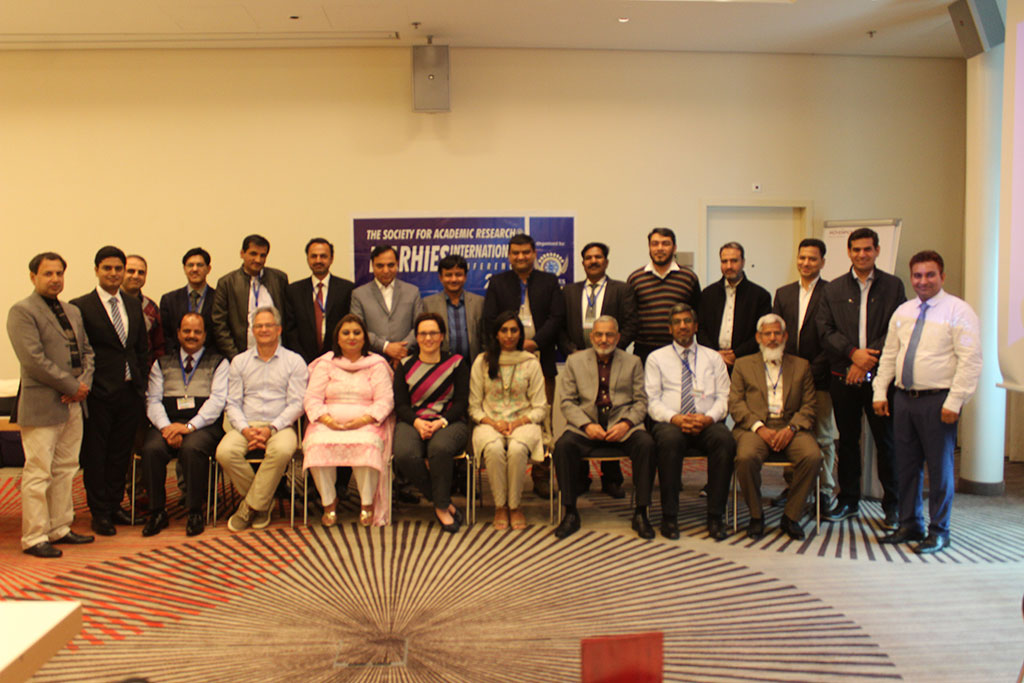
Our plan is to enroll 1 million out of school children by establishing 33,000 schools. This will cover 16% of children out of school and contribute to achieve targets of the sustainable development goals and Vision 2025 of Pakistan.
The conference provided an interdisciplinary platform for academics, researchers, policy makers, activists, students and professionals from across the globe to promote a critical understanding of the innovative and organic approaches towards developing the education sector.
Dr. Nicolene Barkhuizen, a professor from the North-West University in South Africa, incorporated a study of the BRAC model in her research and announced that her team will visit Pakistan to study the model.
IAARHIES is an international non-profit forum and association of researchers in the field of Humanities, Information Technology, Engineering and Science.
Join the world’s biggest family

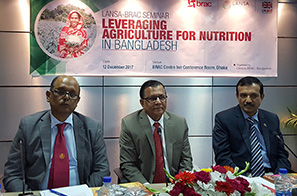
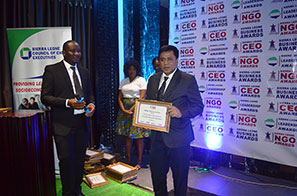

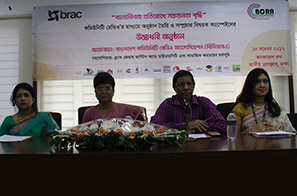
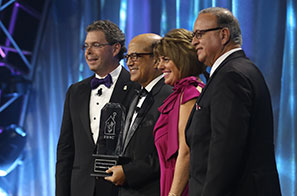
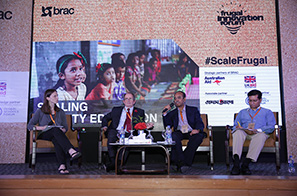
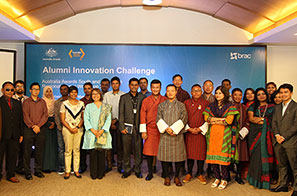 AUD 81,000 worth of grant funding provided to top projects
AUD 81,000 worth of grant funding provided to top projects